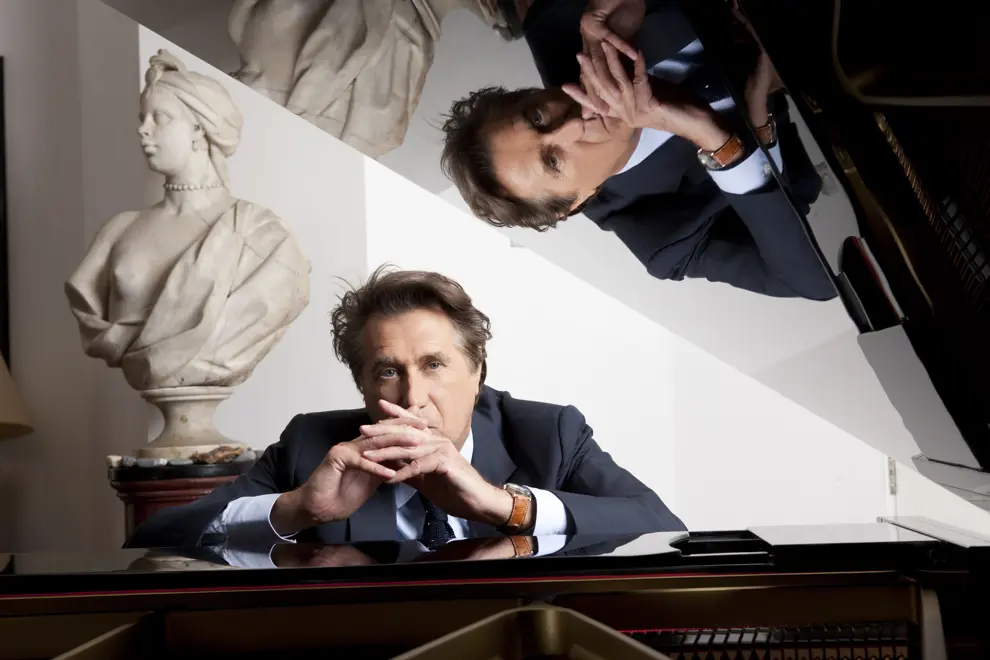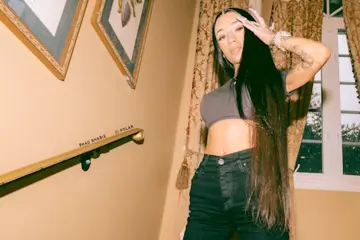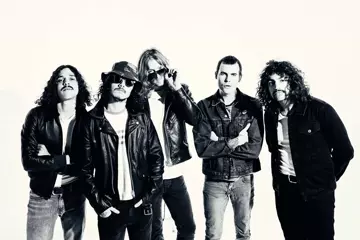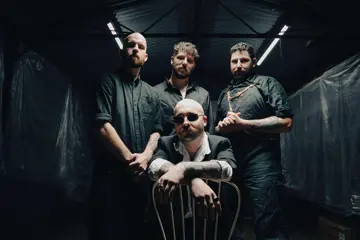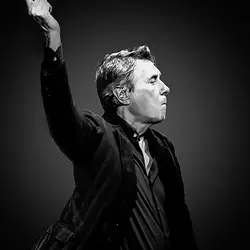 Bryan Ferry
Bryan FerryZooming in from his London studio, Bryan Ferry is seated in front of endless rows of bookshelves—as far as the eye can see. Sporting a dark-hued V-neck sweater over a crisp white shirt, collar out, Ferry is immediately warm and welcoming, laughing easily throughout our chat.
“Can you see this?” he asks, proudly brandishing the limited Super Deluxe Boxset version of Retrospective: Selected Recordings 1973-2023, which curates 81 tracks from his solo career – on five CDs – alongside a 100-page hardback book of extensive liner notes, photos and imagery. “It’s been a busy time getting this together. We finally got the things delivered here and I’m very pleased with it. It’s great. It’s 50 years of solo work.
“So, yeah, it was a lot of sifting through things and seeing which was the best way to present them, you know? We decided to put them into groups of, like, self-written songs in one disc [CD2: Compositions], and then covers in another [CD3: Interpretations], the jazz stuff in that same disc [CD4: The Bryan Ferry Orchestra], and then the rare things, some unreleased things and a couple of new things all on the final disc [CD5: Rare And Unreleased]. The first disc [CD1: The Best Of Bryan Ferry], of course, being the best-of hits – the popular ones, kind of a thing,” he concludes, with a delighted laugh.
“It’s great to have new work that you love”
“We did originally have just 80 songs on this thing [Retrospective…], and then just at the very last minute, I said, ‘Hey, well, we’ve got all this new work that’s gonna come out next year. Let’s just add one of them to this boxset to show people – my fans or whatever – that I’m still working [laughs], and I’m not just looking back at stuff all the time. I’m actually working, every day, on new work. So I’m in a really positive place, work-wise.
Don't miss a beat with our FREE daily newsletter
“I’m really delighted with that [his collaboration with Amelia Barratt, Star – Ferry’s first original music release in over a decade]. I mean, I’ve been working on it on and off for a few years. It started off with just a wisp of an idea from Trent Reznor and Atticus Ross from Nine Inch Nails, who I met when I was on tour in America, I dunno, six, seven years ago. And they sent me these few ideas for it, ‘cause they wanted to collaborate on something, and I said, ‘Great!’ – I like working with younger people, energy and whatever. Music is very collaborative sometimes, and that’s one of the best things about it.
“Anyway, and then I was working with Amelia Barratt, who’s a brilliant young writer, I think. She’s an artist who paints and does performance art; you know, an allrounder. And she came here to my studio to do her audiobook. I helped her do that about three years ago. And we started writing together. So she was the main co-author with me on Star, and she does the reading of it. And I filmed it, so it was like a homemade enterprise.
“It’s interesting how nowadays – to my joy, you know? – You don’t need 20 people in a film crew, and then you get a director in and this and that, as well as production teams. It was just me and my engineer, James [Garzke], and we made the record together with Amelia. And then we filmed her doing it. It was a real ‘do it yourself’, and so I’m very proud of that. Finally, my art school training paid off all these years later [laughs]!
“We have an album, which will come out in the new year. So I hope we can talk about that then and in detail. Yeah, I’m looking forward to that. We just finished the artwork for it yesterday, and it’s all ready to go. It’s great to have new work that you love, you know?
“And I’ve always written my own words – in Roxy Music and my solo compositions – apart from when I was doing, like, you know, Bob Dylan songs or [1973 covers album] These Foolish Things or something. So I’d never worked with a word writer before and this is the first time, so it feels so fresh to me. So, I’ve been able to concentrate very much on the music and getting it right to go with these stories that Amelia creates. Anyway, talk about that later.”
So, has Ferry met Dylan?
“It’s best not to [meet your heroes]. I’m not a Dylan fanatic. I’ve only seen him play once, and that was really good – years ago. I mean, there’s lots of his records I’ve never heard, so I’m not an obsessive. Two of my sons know much more about him than me, I think. They go to see him play at various places and they like Neil Young as well, Van Morrison, that sort of thing. But I don’t really go to gigs, so I don’t meet people. Yeah, meeting Trent and Atticus from Nine Inch Nails was quite rare. I don’t meet people, you know? I don’t hang out. I sort of burrow down [laughs].”
Ferry’s Retrospective… highlights
“Maybe one or two on Disc 5, the rarities-type thing [Rare And Unreleased]. [Consults liner notes] I’ll find where they are. Bob Dylan’s Dream, I really like that one as a cover. Throughout my career, whenever I’ve gone to Bob Dylan’s songs, it’s because the words are so great. I set myself a high standard with lyrics and if I do a song by somebody else, then I have to feel something about the lyric. Dylan’s lyrics and the imagery in his writing are so beautiful, and I like to feel that I get it and try to make something good out of it, you know? As an alternative version to what he has done, yeah.
“Same with – there’s a song called Crazy Love on here, a Van Morrison song, which I really like. And I thought we did a great version of it back in 1977, I think it was, in Montreux in Switzerland. I was there with this phenomenal bunch of musicians for this long winter, where we made an album called The Bride Stripped Bare [1978], and so I had two or three American players over and some English ones. It was an unusual mix of talents, and a really soulful album came out of it.
“Crazy Love was – I don’t know why we didn’t put it on the album at the time, but it’s great when things have been floating around in space for all these years, and you suddenly say, ‘Aha, now I have a place to put you on this record!’ So that’s great.”
Remembering Alan Spenner: ace of bass
“He’ll Have To Go – I like that as well; that was done at the same time. And Feel The Need, which features one of those players, was also done at that time. Alan Spenner, the bass player, who was a genius player – no longer with us, I’m afraid – and I very much miss his playing. He played on Avalon, of course, and Flesh And Blood. And Manifesto was one of his best things as well, actually. But he was wonderful. Some of these players are famous, you see, but a lot of them aren’t, and they’re equally good. They’re great musicians, and I feel a lot for unsung heroes, you know?”
At least their work lives on through the music; they’re immortal, in a way.
“Exactly. That’s the way I see it, yeah. So check that out: Feel The Need.”
“Neil [Hubbard] was one of the unsung heroes of Roxy Music”
“The guitar playing by Neil Hubbard on that [Feel The Need], who was Alan’s friend – that was really sublime. And Neil was one of the unsung heroes of Roxy Music ‘cause I brought him into the band for the last two or three albums. From my solo work, actually, ‘cause I worked with him as a solo artist. But he tucked in, in Roxy, and made everything sound really cool. Some musicians just swing and they have it, you know? Like a groove thing. And I’m really fortunate to work with some of the best.”
On Baz Luhrmann recruiting The Bryan Ferry Orchestra for The Great Gatsby
“The original idea [for The Bryan Ferry Orchestra] was always to do [the songs] as instrumentals, you know? Because I’ve always liked instrumental music. I happen to be a singer, and I write songs, so I’ve always wanted to do something instrumental, which showed my love for the instruments and not having the voice there all the time to dominate proceedings.
“He’s very persuasive, Baz – God bless him [laughs]. And, yeah, in the end, I was pleased to try a couple of them [Back To Black and Love Is The Drug] with vocals, as if from the period. And, yes, he’s such a great enthusiast. It was lovely having him visit the studio here [in London], and I think – like me – he was a jazz fan when he was young, and so he knows what he’s talking about, and I like to think I do, too [laughs].
“So doing music for film was an obvious thing at some point, for me, and they used some of my jazz stuff to good effect in the Babylon Berlin series they did in Germany, which was a good production, actually.”
“I like dark moods and passionate things”
“I like moody, dark songs. I mean, I like film noir as a genre. I don’t like happy-go-lucky films much – it’s not my stuff – and the same with a lot of music, really. In my career, I’ve done one or two uptempo things that really worked. I mean, obviously, Let’s Stick Together was a huge hit for me in Australia and elsewhere, and people really got into that, and I did [laughs]. But generally, I like more dark and mysterious vibes and, yeah, atmospheric things… I like dark moods and passionate things, you know?”
Did we detect castanets within Windswept’s genius arrangement?
“Castanets? Probably. I love castanets, so I’ve used them a few times. It might well be castanets in there ‘cause the rhythmic elements are so dense. There’s so many things going on, but they all seem to gel together, very luckily. And it’s two great bass players, Marcus Miller and Neil Jason. Andy Newmark plays [the] drums, but there’s bits of percussion from here and there. We put some machine percussion in there as well. The guitar playing is beautiful. And Neil Hubbard, Chester Kamen and David Gilmour – so it’s not such a bad line-up for a team, you know? Then David Sanborn plays sax on it as well, yeah. So I’m tucked in the background with the piano [laughs].”
“Grooves and mood were the key elements that I was interested in”
“It’s what I was doing those years, with [1982’s] Avalon and [1985’s] Boys And Girls – grooves and mood were the key elements that I was interested in. But there’s bits of lyric [in Windswept] that I like as well, and the singing; I sing it better than most things I do ‘cause I just felt it so much at the time. And the singers with me are Michelle Cobbs, Fonzi Thornton – the American singers I work with from New York.
“And, yeah, Fonzi used to work with Aretha a lot, Aretha Franklin, as her kind of lead guy. And he was my buddy, always on tour – a very nice man. And we grew up listening to the same records, you know? Motown and R&B stuff. And so we would talk all day and all night on tour about records we love.”
How does being a songwriter change how you listen to other people’s music?
“Hahaha, it means you listen less to it. It’s great if you hear something that you love and you go, ‘Oh, wow, that’s fantastic!’ Just recently, I was doing a couple of BBC interviews for various stations when they say, ‘Can you choose ten songs or something that you like?’ or whatever. And I’ve done that. And it’s great when you sit there playing it, like, ‘Oh, I love that; I always have loved it,’ you know? So it might be something like a Phil Spector record or something from way back, from the 1960s, and you just think, ‘How great! They really nailed it,’ you know? And so you do admire things that stand the test of time.”
Writer’s block for words
“[I’ve never struggled with writer’s block] for music, but for words. I mean, I’ve always found something to do musically. If I was left alone long enough to fiddle around with piano or keyboards, then I think I’m pretty good at coming up with something. Music is more abstract, so it’s more about emotions, moods and colours. But once you start trying to particularise those moods with words, it sometimes loses a bit of the magic, and you think, ‘Mmm, these words aren’t as good as the music.’
“And sometimes I’d go round and round for months, wrestling with a song, and then one day you’ll come back to it, and you go, ‘Oh,’ you know? And you’ll find something that just seems to be it, you know? And, ‘Why didn’t I think of that before?’ [laughs] So sometimes you have to be very patient. And writer’s block is a terrible thing where you just think, ‘Oh, nothing I write is good enough,’ you know?
“I think that happened with Slave To Love, which was actually my biggest hit as a solo artist. It was a great ambassador for my music in the sense that people liked it everywhere. And maybe it brings them to listen to the rare other stuff, which is the deeper stuff or whatever, or less commercial or less accessible perhaps. And so it’s a good thing. It’s been a very good friend to me, that song.
“As was More Than This, ‘cause people love that tune. And I loved it, too. It just came out of nowhere. And things just come out of nowhere – the best things, you know? It seemed to be like a gift.”
When did you discover you were a top whistler?
“On my newspaper round, probably [laughs], because there’s not much else you can do! It’s sort of carrying around this huge bag of newspapers and magazines. And when I was a kid – for years, at school – I’d deliver the newspapers in the morning, before school, and then in the evening, after school – the evening papers. And that’s when I would read the jazz magazines and stuff that I was delivering. And, yeah, I guess I’d whistle, and I’d whistle the records that I liked that I’d started collecting, you know?”
Before Walkmans, I guess whistling was a way to create your own soundtrack.
“Yeah, that’s right. So you just whistle. It’s alright in limited doses, you know?”
Compiling photos for liner notes: “A trip down memory lane”
“Some were real photographs, and I’m saying, ‘Oh, great, I haven’t seen that one before,’ or I certainly couldn’t remember seeing it. And so it was a trip down memory lane – very nice, it was – and it triggered all these different memories of players that I’d worked with at that time and the places I’ve been to, ‘cause some of them are photographed in different countries by different photographers, people who I really liked.
“I’ve always got on well with visually talented people and some of the people who took the pictures were really good: Eric Bowman, Antony Price. And some weren’t professional photographers, but they were designers who could take a picture and happened to be with me on holiday or something.”
Did you visit any Australian museums or art galleries during previous tours?
“Pretty much all of them. Yeah, that’s what I do on my day off when I’m travelling in Australia; there’s some great things in each state museum. And in America – phenomenal things that you see in the States. There were so many, I guess, robber barons and so on in each city who would donate massive collections. So, it’s been a great thing travelling the world and going to all these museums and, yeah! Just seeing so much stuff. It’s very good for the mind to see beautiful things.”
When you first started your music career, were you confident about longevity?
“No, not at all. I had very little confidence as a young man, and it was really just the desire to make a record that was very strong. I mean, I really wanted to be a visual artist when I was at college – that’s what I was training to do – but then music had been a big passion for me since I was, say, nine years old. And I saw my first concert with my uncle Bryan, who took me to see Chris Barber’s Jazz Band that featured Lonnie Donegan, the banjo player who had a big hit with a couple of blues songs like Good Night Irene and Rock Island Line and stuff. And those players introduced jazz to the British public, you know? Jazz and blues – early blues – through the skiffle bands that they had within the jazz bands.”
“I never thought I could be anything like them, or play on those stages, but I did”
“I saw The Platters when I was ten, I think, and then I started seeing all these jazz players. So I never thought I could be anything like them or play on those stages, but I did. And, yeah, while I was a student, I started dabbling and singing in the college band. And when I graduated, I moved to London, and I started writing some songs, and that’s when I thought, ‘Well, maybe I can put my art into music rather than having it separate. My art is the real thing, and music is just for fun,’ you know? I just brought them together and started making pictures in sound with the band that I put together.”
“I was very particular about who I wanted in the group”
“They were all great players in the band [Roxy Music], you know? I was very particular about who I wanted in the group, and I said, ‘I’ll take plenty of time just to find the right people.’ Andy Mackay [oboe/saxophone] and then Brian Eno [synth], and then Phil Manzanera [guitar] and Paul Thompson [drums] – very important, yeah – and the bass player [Graham Simpson] was from my old college band, so we were close; he was only there for the first album [1972’s Roxy Music], and he moved on.
“But, yeah! It just developed and turned into something. I’d never dreamed I would be able to express myself so well. Every artist wants to express themself through a particular medium, and, with music, it was perfect for me because I had the lonely, tortured bits where I could write the song on my own, and then you take the idea and develop it and see how it works with other instruments, and eventually make a record. And then finally you go and play it to an audience – all these different stages make it very interesting and, yeah! It’s been – so far – still finding new things to do and couldn’t be better, really.”
On Bowie considering Roxy Music as his only artistic peers
“[Bowie] always said very complimentary things about the band and my writing and my singing. I mean, he made a great career, and, yes, there were a few different people around at that time who all did really well, and each one managed to create something different, you know?
“With Roxy, one of the nice things is that there were so many different sounds we had in the band, like Andy Mackay’s oboe, as well. I love the oboe as an instrument and he plays sax, obviously, as well. So that whole range of sounds was covered, from high to low, with the baritone and guitar. Phil Manzanera was very adventurous, always finding really weird, interesting sounds, and Eno was terrific in all departments – and funny. We got on very well. Humour, you know? Humour is very important in the dark days [laughs].”
Is a live album/DVD of Roxy Music’s 50th anniversary tour in the works?
“I don’t know. It’s a lot of work doing those things. If somebody has the time to edit it, yeah, maybe it could be released down the line. This year hasn’t been possible because I’ve been working on my new stuff and then putting this together. I wanted to make a good job of it because, you know, I’ve gotta wait another 50 years to do it again, so I’m running out of time a bit [laughs].
“It went really well, that tour. We did, I guess, a dozen places in America. Then we did three places in the UK, and we finished in London, and those last three shows were really good, I think. They were recorded, I know because nowadays they record everything.
“It’s best to look at the screen, and you see all these different images that were put into the playback thing. You could always look at the stage as well, but then you just see little figures. Because they were arena shows, we made it look really good – one or two of the songs looked beautiful.”
Bryan Ferry’s Retrospective: Selected Recordings 1973-2023 is now via BMG. You can order exclusive CD or vinyl here.

